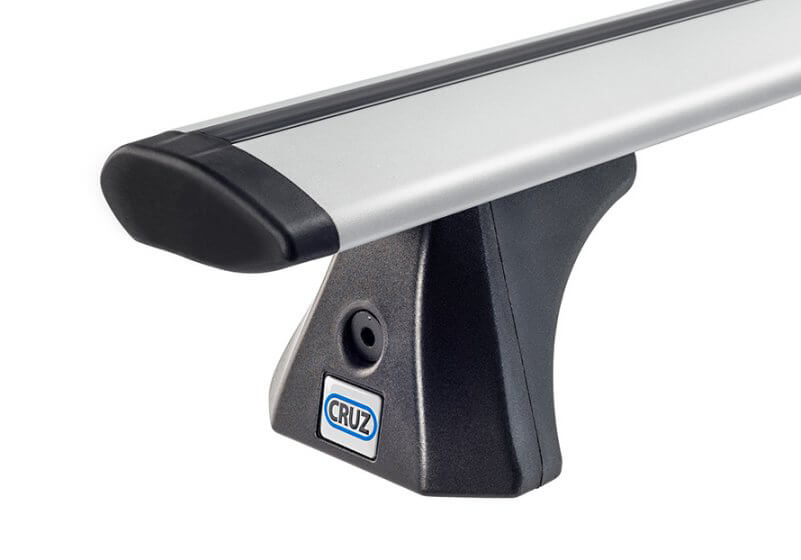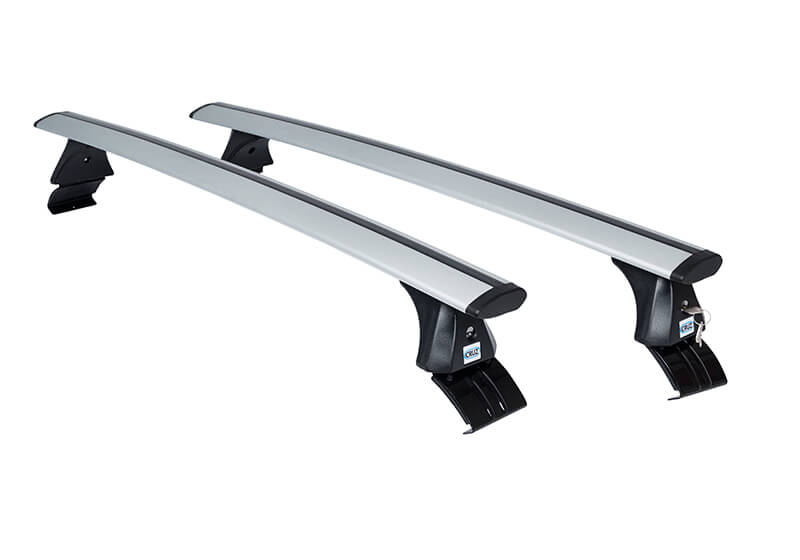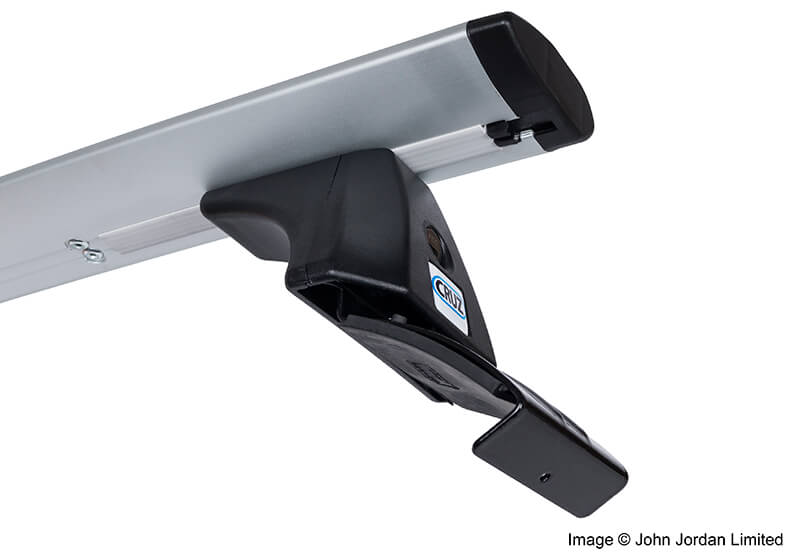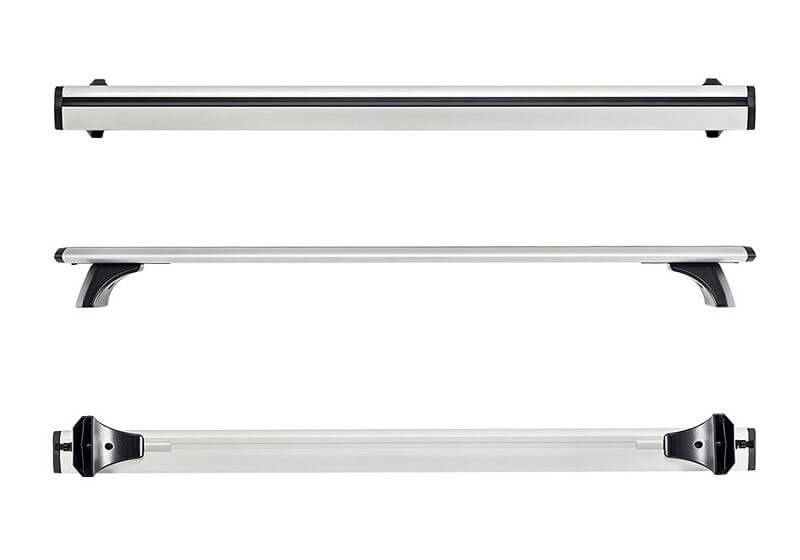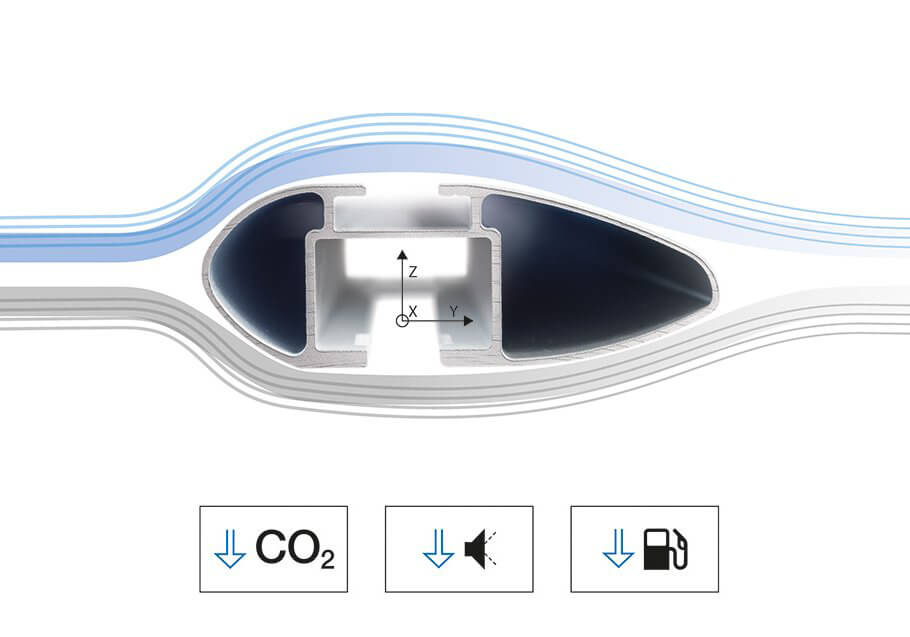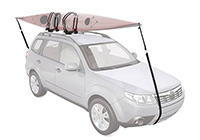CRUZ 108cm Airo T silver aluminium roof bars with fitting kit 5405
£129.95
Low stock
CRUZ makes the best value roof bar system in the mid market, no doubt about it. They're well designed, well made, with a very wide range of fitting kits, and these new Airo bars look superb.
These bars are supplied as a combined bars and "foot pack" set and, with fitting kits priced relatively cheaply, this looks like an unbeatable modular system that you should be able to move from car to car with only a new fitting kit.

CRUZ makes the best value roof bar system in the mid market, no doubt about it. They're well designed, well made, with a very wide range of fitting kits, and these new Airo bars look superb.
These bars are supplied as a combined bars and "foot pack" set and, with fitting kits priced relatively cheaply, this looks like an unbeatable modular system that you should be able to move from car to car with only a new fitting kit.

|
The new CRUZ OptiPLUS roof bar system is superb - it's good looking, strong (the load limit is 75kg, depending on the vehicle), easy to use, and the same roof bar feet are used for almost all cars made since 2005 (excluding cars with raised roof rails). Chances are that, if you buy into this system, you'll only need to spend £20 (flush rail kits are £25) on a new fitting kit when you change your car. You need to order two components: (1) a pair of aluminium bars and (2) a vehicle specific fitting kit to join the bars to the roof. The CRUZ standard length Airo aluminium bars, and the fitting kit, have been pre-ticked in the list below. So far as we are aware, the CRUZ Airo low noise, low drag aerofoil-shaped aluminium bars are the only low noise bars available in this price range. Aerofoil shaped roof bars were developed by Whispbar and are now also used by Thule, increasingly by Atera, and now also by CRUZ! The reduced drag means that fuel consumption will also be lower. Features:
Locks are available as an accessory and are listed below; they are also very well priced. All CRUZ roof bar systems are fully TÜV approved and have a 2 year guarantee. Please note that CRUZ adapter kits will only work with CRUZ roof bars. Cruzber is Spain’s largest roof bar and roof rack manufacturer, founded in 1963. It sells most of its products under the CRUZ brand label, operating from over 50,000 square feet of modern premises and using state of the art manufacturing machinery. Cruzber is highly regarded in the European market in particular. We have no doubt that CRUZ branded roof bars are the best made and overall best value in the mid market. Important information about roof top tents |
|
The aim of this note is to persuade you that kayaks should always be tied to the carrying vehicle at both bow and stern.
Untied kayaks have, in our experience, the greatest potential for a roof bar or kayak carrier failure. The massive forces that untied kayaks can generate have even been known to snap roof bar fixing bolts with the result that a complete assembly of roof bars and kayaks has ended up on the road. We know that this has happened with almost every brand of roof bar, and regardless of whether the kayaks are on a special carrier or just strapped to the bars. You need to fix bow and stern lines, probably using the front and rear screw-in towing eyes to get strong and accessible fixing points on the vehicle. Kayak shops should be able to provide suitable 'paracord' for this purpose. Alternatively, we have sets of straps available that are perfect for the job and are really easy to use. Yakima make some excellent Bow/Stern tie down straps and Thule makes the QuickDraw 838 which we have listed together with every kayak carrier we sell. Please note that kayaks should be strapped to the roof bars, or to kayak carriers, using straps that are suitable for the purpose, e.g. 25mm polypropylene straps with strong buckles. Bungee cords must never be used. Please also note that all roof bar instructions point out the dangers of carrying unsecured long items, as of course do all kayak carrier instructions. If you tie down your kayaks properly you almost certainly won't experience a product failure. If you don't you may or may not get away with it. If there is a disaster and the kayaks end up on the road, separated from the vehicle, then you were not using tie downs and you have subjected the roof bars to forces for which they were not designed. The costs of sorting this out are yours, not ours, and you may also have difficulties with your insurers. We're sorry to be so firm about this, but "things coming off the tops of cars" is the stuff of nightmares, and we want to do all we can to prevent accidents of this sort from happening. |
Delivery charges and arrangements:We charge a contribution towards delivery costs, depending on what you order, where you live, and how quickly you want the goods. These are our standard charges; there are usually surcharges for all offshore destinations and some remote postcodes - for details please see our delivery information page.
Delivery of other items
Delivery timesDelivery times are calculated in working days (Monday to Friday, excluding Bank holidays). Cut-off times for Express Delivery orders
Delivery FAQsWhen will my order arrive? What about Next Working Day delivery? Is my delivery day guaranteed? Do I need to be at home? Payment options:We take the following cards, and also PayPal. Please note that the entry on your card statement will be from "The Roof Box Company". 



Secure paymentsOur website is secured by Sectigo (formerly Comodo CA), the largest commercial Certificate Authority in the world. 

|
|||||||||||||||||||||||||||||||||||||

Roof Tents should NOT be fitted to vehicles with clamp-mount roof bars Roof top tents are becoming increasingly popular, but we advise they should not be carried on vehicles that use clamp-mount roof bars. There is too much risk of damage to the roof, which would also be a massive safety issue because the roof bar clamps would not work correctly. Clamp-mount roof barsIf you are reading these notes then your vehicle has a plain roof and uses clamp-mount roof bars. Our advice is that plain roof vehicles are not suitable for carrying roof top tents; we only recommend fitting roof tents to vehicles with roof rails, fix points, T-tracks or gutters, because here the roof bars and the roof load sit on the roof welds, where the sides of the vehicle are welded to the roof part; these are strong points. Clamp-mount systems for modern cars often sit outside these roof welds, on the ordinary unreinforced roof steel towards the edges of the vehicle roof. The danger is that a plain roof may well not be strong enough to cope with the static weight of a roof tent and the occupants. This weight can cause the roof bar feet to make dents in the roof, which not only damages the vehicle but means that the clamping plates can no longer work as designed, so the safety of the whole roof bar system is compromised. The weight of a tent can easily be 65kg (hard top tents can be over 75kg) plus roof bars at 8kg and two adults at let’s say 90kg each, that’s a total 253kg, well over 3 times the typical 75kg dynamic loading limit. If there are three occupants at let’s say 80kg each then we get to 313kg. We supply tents made by Thule and by Yakima, respectively the world’s biggest and second biggest car rack manufacturers. Their tent instructions state that clamp-mount roof bars are not suitable for plain roof bars - ‘DO NOT use’. These brands would not turn away business if this matter is not important. Thule's guidelines or instructions should be available via the Fitting instructions and videos tab. We realise that this advice is confusing because these specific instructions are part of Thule’s and Yakima’s roof tent instructions, but are not included in their roof bar fitting instructions. We also supply CRUZ and Atera roof bars; again, no mention is made of roof tents in their roof bar instructions. It is the roof bar feet that can make dents in vehicle roofs, even though it is a roof tent plus human(s) that caused the overloading; where we have supplied the roof bars, customers may look to us for repairs to their vehicles. The safety implications are a much bigger worry for us than the vehicle damage implications, which is why the safe option is to advise that no roof tents should be fitted to clamp-mount roof bars – all roof tents are very heavy, and many or indeed most of them are heavier than Thule or Yakima tents. We can only advise you; we can’t stop you from carrying inappropriate loads. But if you do purchase clamp-mount roof bars from us, and use them for carrying roof tents, even where you have informed us that you wish to carry a tent, it is reasonable that we will accept no liability for damage to the vehicle, to the roof tent, or to third parties. If in doubt, we suggest that you obtain a written statement from the roof tent supplier to the effect that their tent may be carried on clamp-mount roof bars; this should provide you with some ‘cover’ in the event of any need for a claim. Roof top platformsFull size platforms such as the Thule Caprock and the Yakima LockNLoad platform should also not be used on clamp-mount roof bars; they tend to be heavily loaded, and to be walked on. |
|
Fitting PDFs We’re showing you Thule’s instructions about the use of roof top tents to help you make an assessment about whether any brand of tent is safe to carry on clamp-mount roof bars. |







